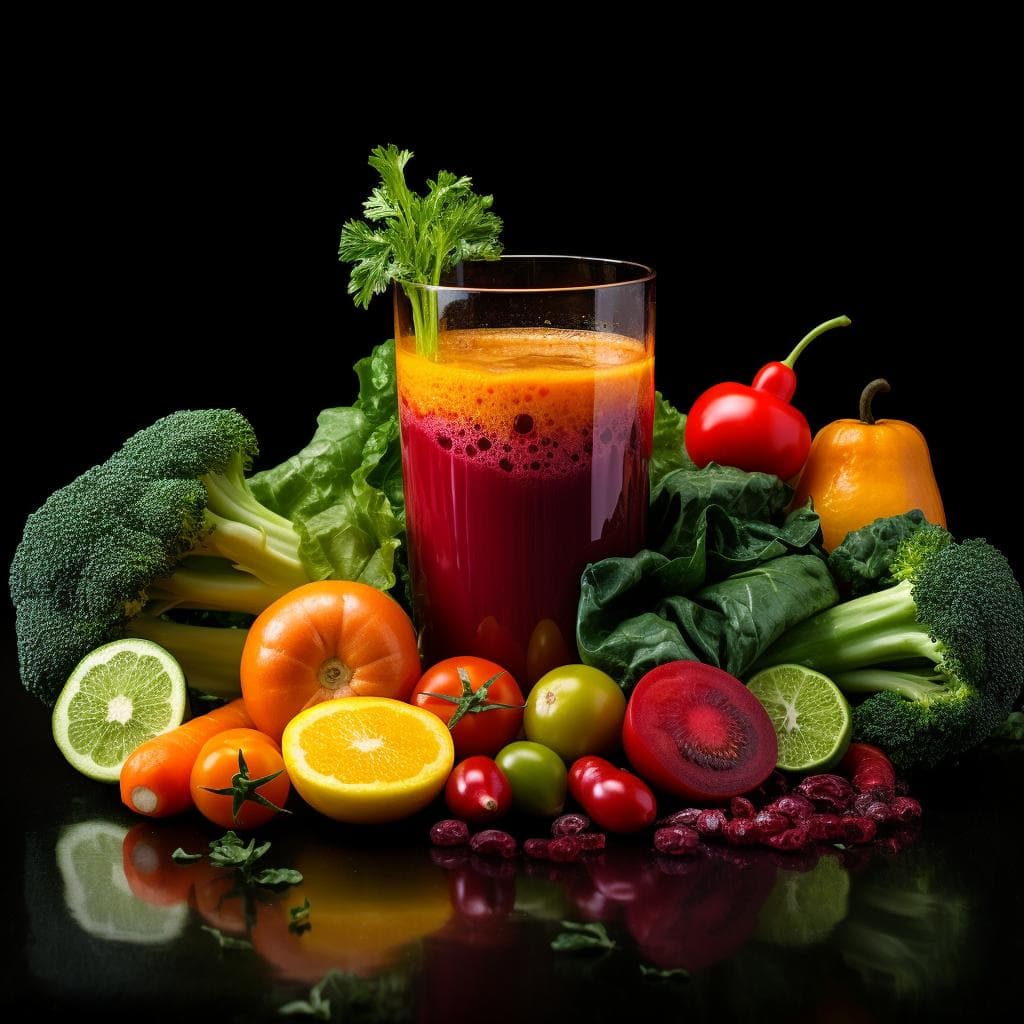In our quest for a healthy lifestyle, we often seek convenient ways to incorporate essential nutrients into our diets. Vegetable juice has gained significant popularity as a quick and easy way to consume a variety of vegetables. But does vegetable juice truly provide all the necessary nutrients for a well-rounded diet? In this article, we will explore the nutritional value of vegetable juice, examining its benefits, drawbacks, and the importance of incorporating whole foods into our meals.
Understanding Nutrients and Their Importance
Before delving into the world of vegetable juice, let's take a moment to understand the significance of nutrients in our bodies. Essential nutrients are substances that our bodies require for proper functioning and maintaining overall health. They can be broadly categorized into macronutrients (carbohydrates, proteins, and fats) and micronutrients (vitamins and minerals). These nutrients work synergistically to support vital bodily functions and promote overall well-being.
Vegetable Juice: A Convenient Source of Nutrients
Vegetable juice has gained popularity as an easy and accessible way to obtain a range of nutrients in one glass. It offers a convenient alternative to consuming whole vegetables, especially for individuals who struggle to meet their recommended daily intake. By extracting the juice from various vegetables, we can create a concentrated beverage rich in vitamins, minerals, and phytonutrients.
When it comes to vegetable juice, the nutrient composition largely depends on the types of vegetables used. Common vegetables used for juicing include leafy greens like spinach and kale, along with cucumbers, carrots, beets, and celery. Each vegetable brings its unique set of nutrients to the table, making vegetable juice a potentially nutrient-dense option.
Essential Nutrients in Vegetable Juice
Vegetable juice can be a good source of essential nutrients. It is particularly rich in vitamins A, C, and K, along with minerals such as potassium and magnesium. These nutrients play vital roles in supporting immune function, promoting healthy skin, aiding in bone health, and maintaining proper cell function. By incorporating vegetable juice into your diet, you can supplement your nutrient intake and contribute to overall well-being.
However, it's important to note that some nutrients, such as dietary fiber, are not as abundant in vegetable juice compared to consuming whole vegetables. Fiber is crucial for digestion, promoting feelings of fullness, and maintaining a healthy gut. While vegetable juice may lack in fiber content, there are other ways to ensure you're meeting your fiber needs, which we will discuss later in this article.
Benefits and Drawbacks of Vegetable Juice
The Benefits of Vegetable Juice
Drinking vegetable juice offers several potential benefits. Firstly, it provides a concentrated source of vitamins and minerals, allowing for efficient nutrient absorption. This can be particularly advantageous for individuals with digestive issues or those who struggle to consume enough whole vegetables.
Additionally, vegetable juice is a quick and convenient way to increase your vegetable intake, especially for individuals with busy lifestyles. It can be an excellent option for those looking to boost their nutrient intake, support immune function, and enhance their overall well-being.
The Drawbacks of Vegetable Juice
While vegetable juice has its benefits, it's essential to be aware of its limitations. One of the primary drawbacks is the potential loss of dietary fiber during the juicing process. Fiber is crucial for maintaining a healthy digestive system, regulating blood sugar levels, and promoting feelings of fullness. Without an adequate fiber intake, you may miss out on these important benefits.
Another consideration is the potential increase in sugar content when certain fruits are added to vegetable juice for flavor. Fruits like apples and oranges can elevate the natural sugar content of the juice. While fruit sugars are natural, excessive consumption of sugary beverages can lead to negative health outcomes, particularly for individuals with certain health conditions.
Factors Affecting Nutrient Availability in Vegetable Juice
When it comes to vegetable juice, the methods used for juicing and processing can affect the overall nutrient availability. High-speed juicers and prolonged juicing can expose the juice to heat and air, potentially leading to oxidation and nutrient degradation. To maximize the nutrient content of your vegetable juice, consider the following tips:
* Opt for cold-pressed or slow juicers that operate at lower speeds, minimizing heat and oxidation.
* Consume freshly prepared vegetable juice rather than storing it for extended periods, as nutrients can degrade over time.
* Store vegetable juice in airtight containers and refrigerate promptly to slow down nutrient degradation.
By following these practices, you can maximize the nutritional benefits of vegetable juice and ensure that you're getting the most out of your glass of goodness.
Complementary Nutrition: Incorporating Whole Foods
While vegetable juice can be a valuable addition to your diet, it's essential to remember that it should not replace whole foods entirely. Whole vegetables offer benefits beyond what can be obtained from juice alone. They provide dietary fiber, which aids in digestion, promotes satiety, and supports a healthy gut microbiome. Including a variety of whole vegetables in your meals ensures a well-rounded and balanced nutrient intake.
To strike a balance between vegetable juice and whole foods, consider the following tips:
* Consume vegetable juice as a supplement to your regular meals, rather than relying solely on it for nutrition.
* Incorporate whole vegetables into your meals and snacks to ensure a diverse range of nutrients and fiber.
* Experiment with salads, stir-fries, and soups that feature an array of colorful vegetables to maximize nutrient intake.
By combining vegetable juice with whole foods, you can create a comprehensive and nutrient-rich eating plan that supports your overall health and well-being.
Expert Opinions and Research Studies
Scientific studies have explored the nutritional value of vegetable juice and its impact on health. While there is evidence to suggest that vegetable juice can contribute to nutrient intake, it's important to consider it as part of a broader dietary approach. Experts recommend incorporating a variety of fruits, vegetables, whole grains, lean proteins, and healthy fats into your diet to ensure optimal nutrition.
Ongoing research continues to shed light on the benefits of vegetable juice and its role in supporting health. As our understanding evolves, it's crucial to stay updated with current research findings and consult with healthcare professionals or registered dietitians for personalized advice.
Conclusion
In conclusion, vegetable juice can be a valuable source of essential nutrients, providing a convenient and concentrated way to supplement your diet. It offers an array of vitamins, minerals, and phytonutrients that support various bodily functions. However, it's important to be mindful of the potential limitations, such as the reduced fiber content and the need for a balanced approach to nutrition.
To optimize your nutrient intake, consider incorporating both vegetable juice and whole vegetables into your meal plan. This way, you can benefit from the convenience and concentrated nutrition of vegetable juice while also enjoying the fiber and additional health benefits offered by whole vegetables.
Remember, balance is key when it comes to nutrition. By making informed choices and embracing a well-rounded approach to eating, you can ensure that you're providing your body with all the necessary nutrients it needs to thrive.
FAQs
1. Is vegetable juice a suitable replacement for eating whole vegetables? While vegetable juice can provide a concentrated source of nutrients, it should not replace whole vegetables entirely. Whole vegetables offer dietary fiber and other beneficial components that may be lost during the juicing process. It's best to incorporate both vegetable juice and whole vegetables into your diet for optimal nutrition.
2. Are there specific vegetables that are better suited for juicing? Various vegetables are suitable for juicing, including leafI apologize, but it seems that the response got cut off. Here are the remaining FAQs:
3. Are there specific vegetables that are better suited for juicing? Various vegetables are suitable for juicing, including leafy greens like spinach and kale, cucumbers, carrots, beets, and celery. These vegetables are rich in vitamins and minerals, making them excellent choices for juicing.
4. Can vegetable juice provide all the necessary nutrients for a healthy diet? While vegetable juice can contribute to nutrient intake, it's important to have a balanced diet that includes a variety of foods. Vegetable juice may lack certain components like dietary fiber, which is abundant in whole vegetables. Incorporating both vegetable juice and whole vegetables ensures a comprehensive nutrient profile.
5. Should I be concerned about the sugar content in vegetable juice? Vegetable juice itself generally contains low amounts of sugar. However, when certain fruits are added for flavor, the sugar content can increase. It's important to be mindful of the overall sugar intake from both vegetables and fruits to maintain a balanced diet.
6. Can I prepare vegetable juice in advance and store it? While it's best to consume vegetable juice immediately after preparation to maximize nutrient content, you can store it in airtight containers in the refrigerator for a short period. However, keep in mind that nutrient degradation may occur over time, so fresh juice is always preferable.
Remember to consult with a healthcare professional or registered dietitian for personalized advice regarding your specific dietary needs and goals.




